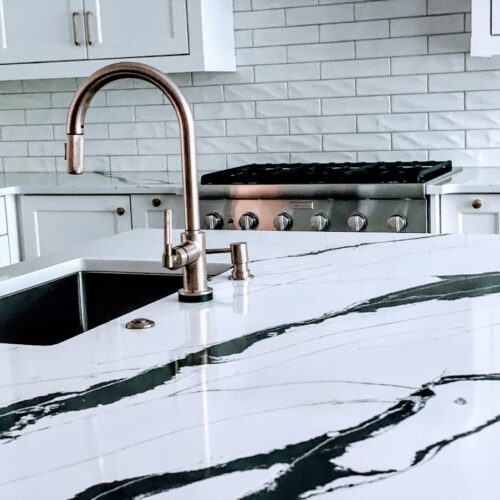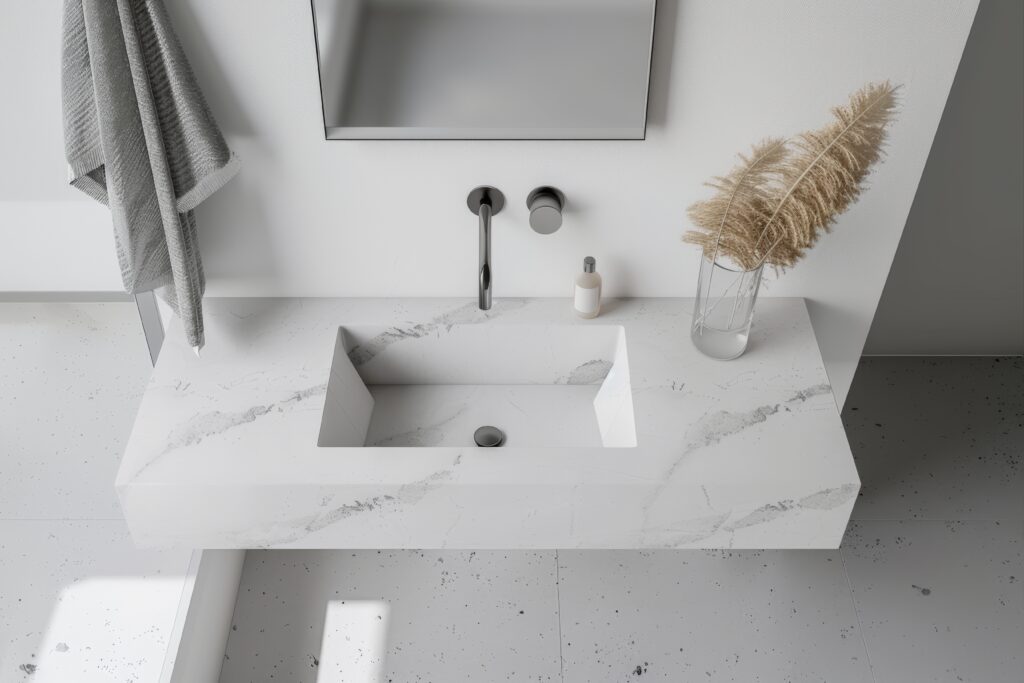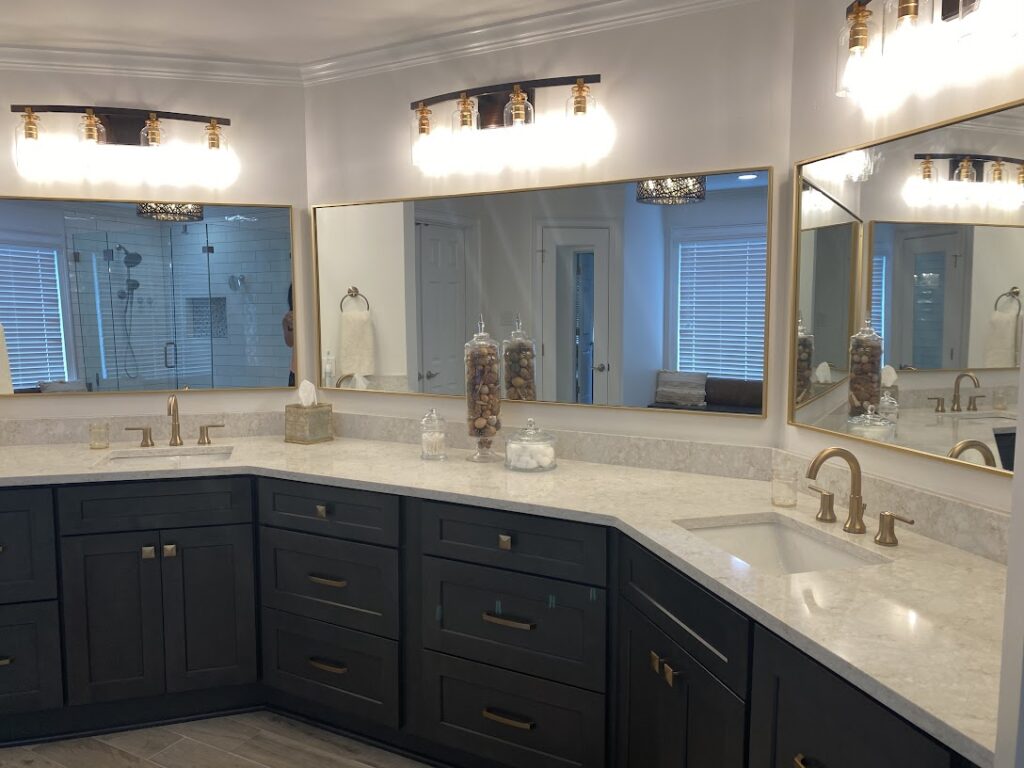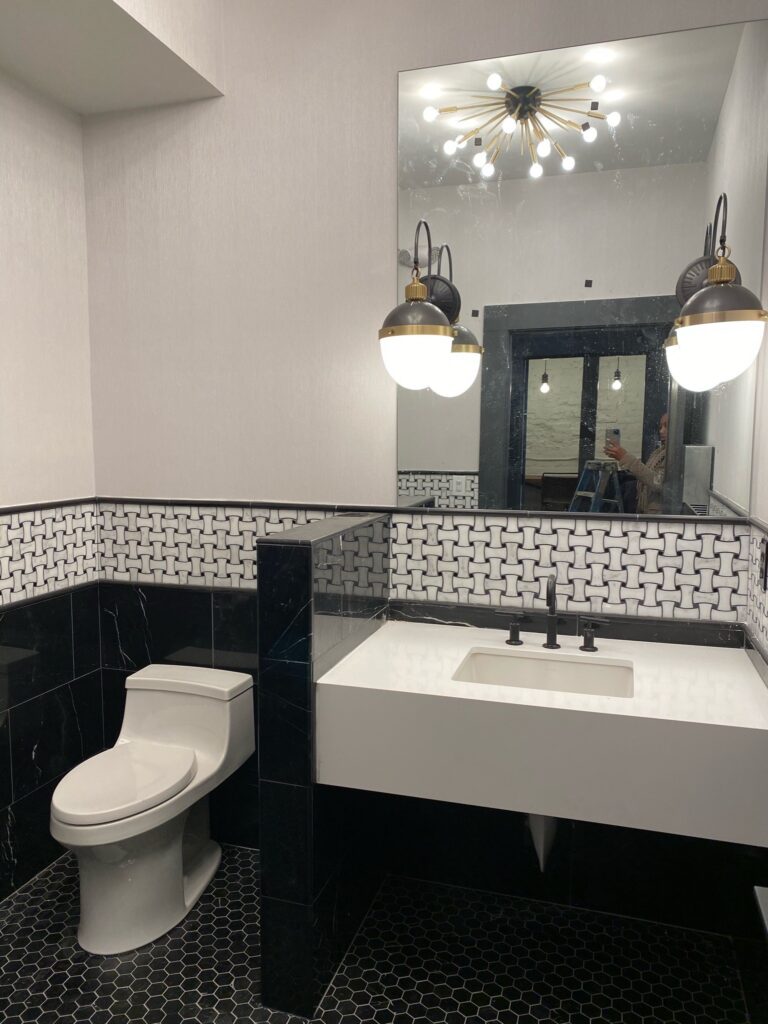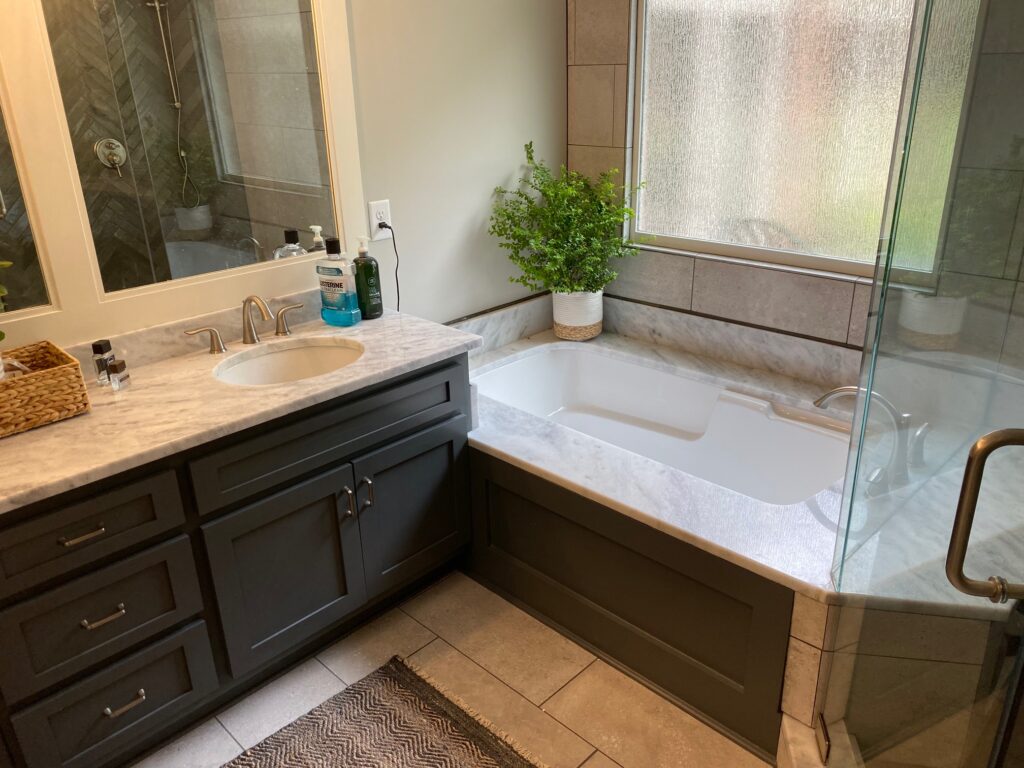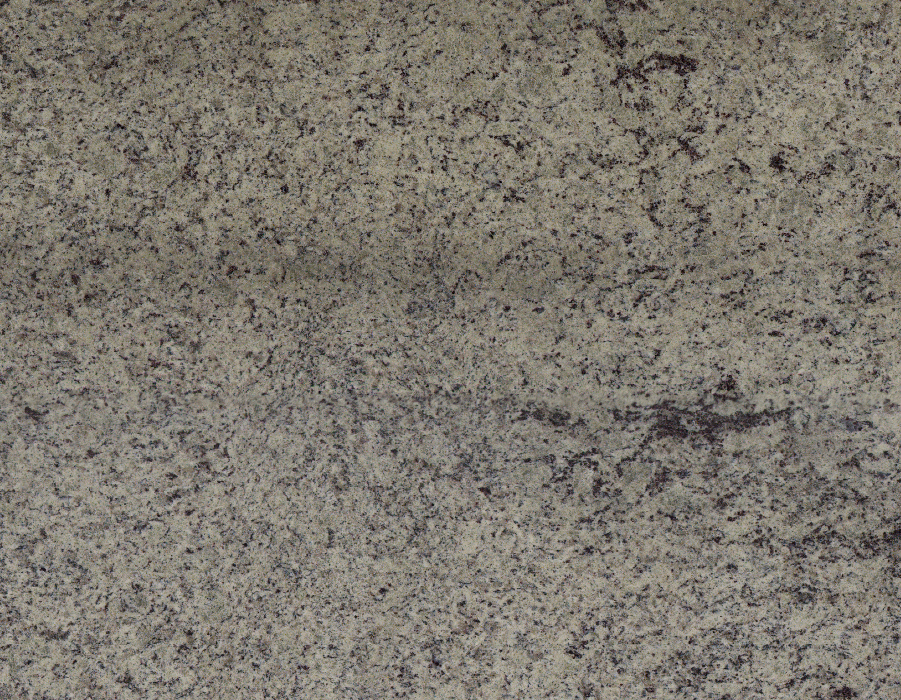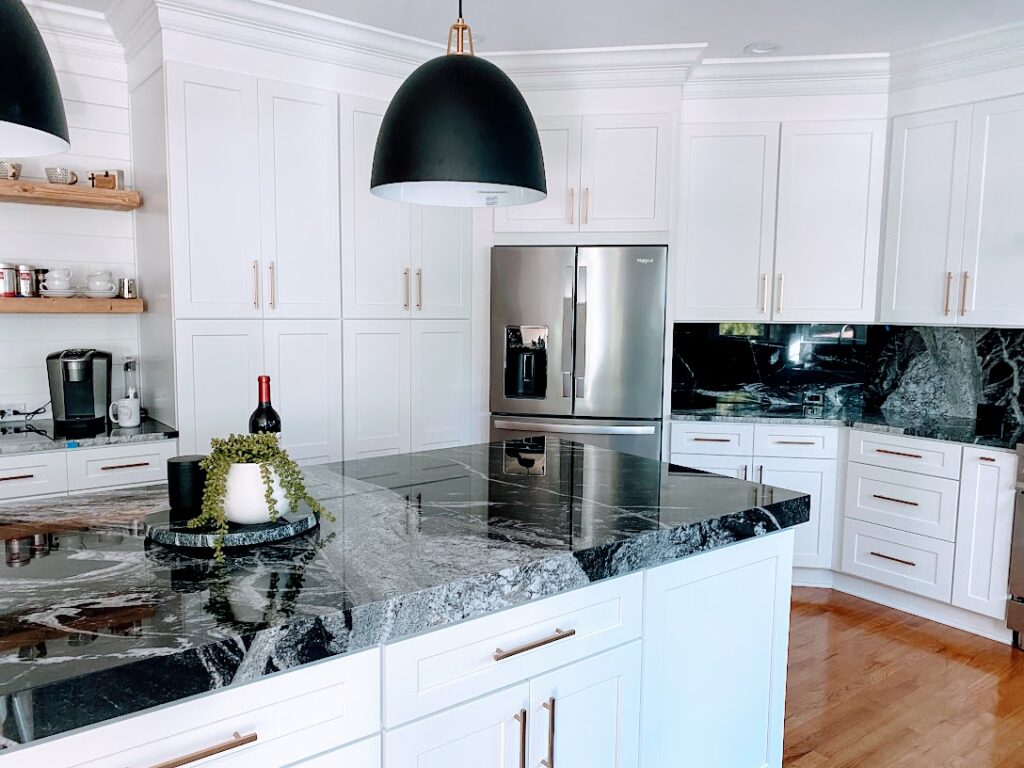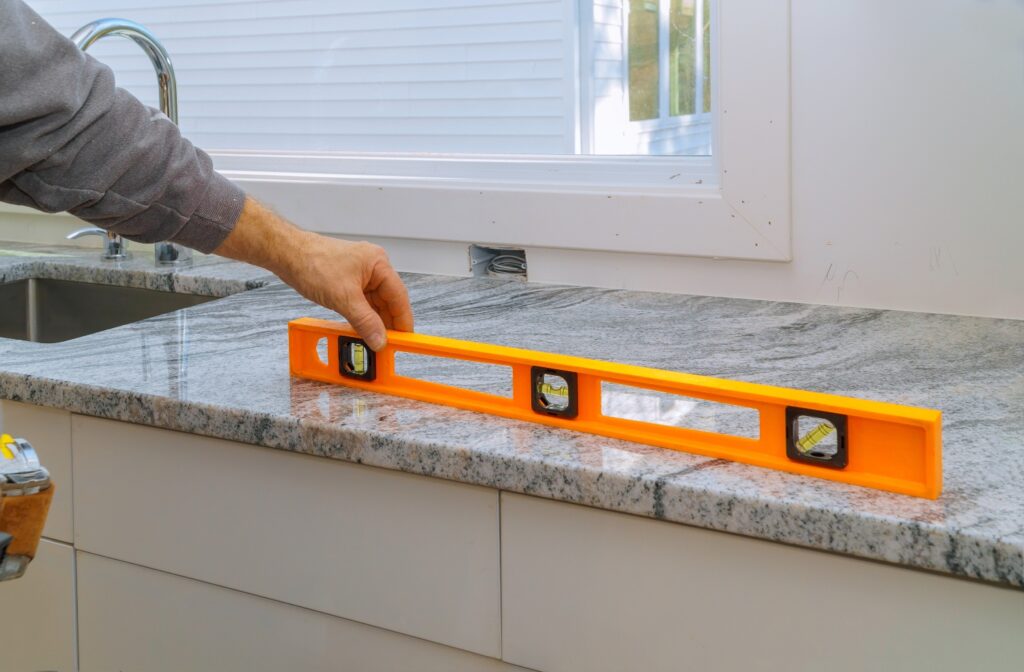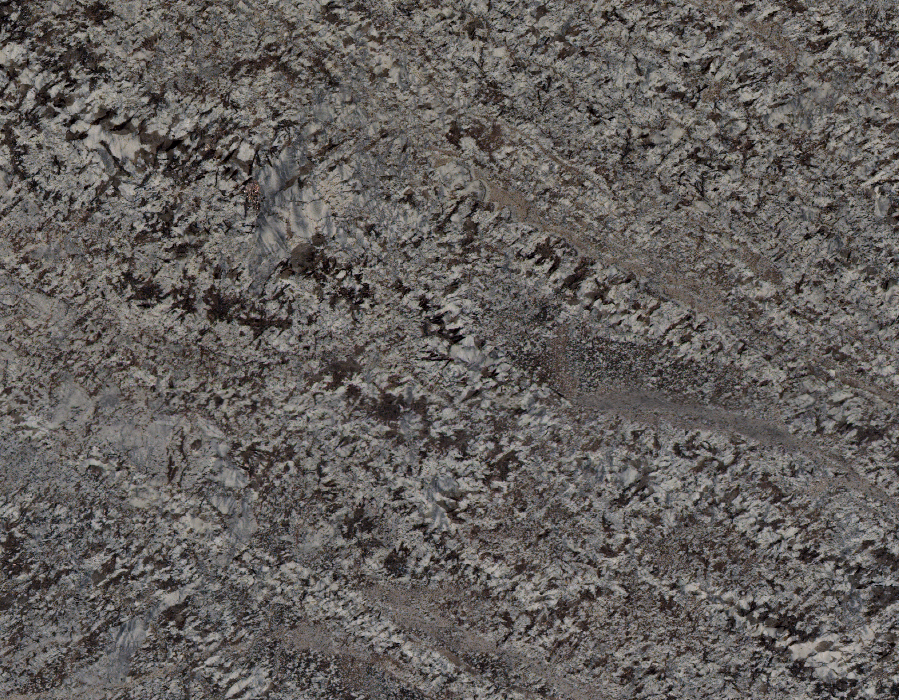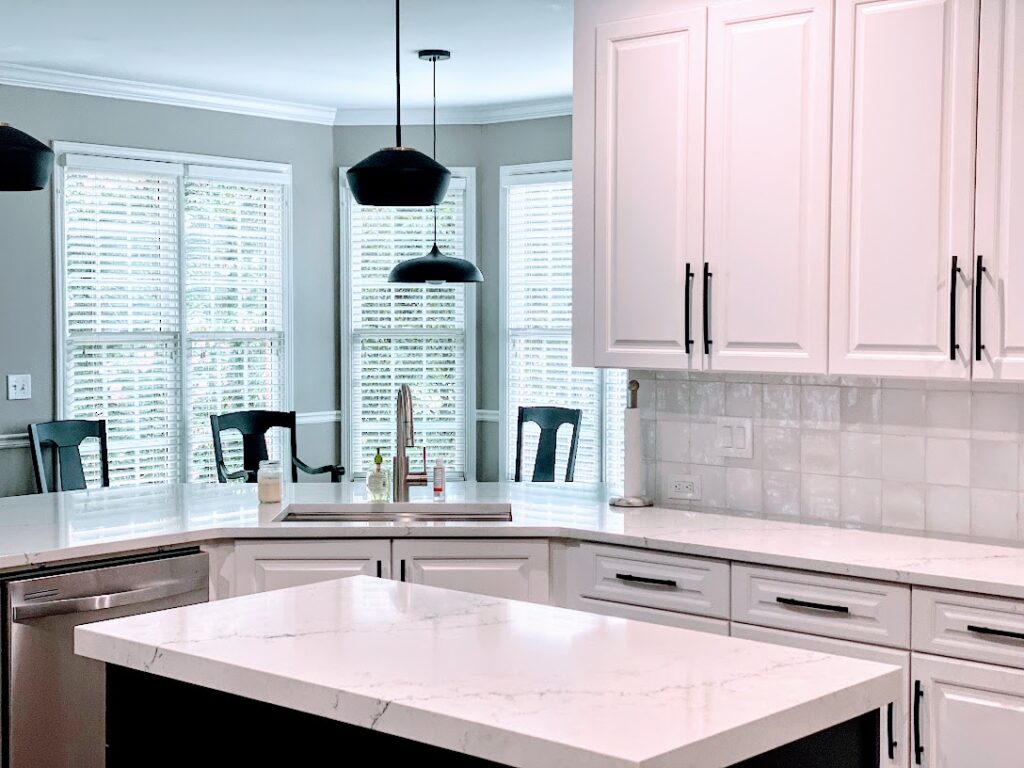Quartz Countertops vs. Concrete Countertops
When deciding between quartz and concrete countertops, you’re faced with a choice that goes beyond aesthetics. Quartz offers a sleek, non-porous surface that’s easy to maintain, perfect for a modern kitchen setting. On the flip side, concrete provides a unique, customizable look that can add a rustic charm to your space, though it does require more upkeep. Both have their own set of advantages and challenges, but how do they stack up in terms of cost, durability, and environmental impact? Let’s explore the nuances that might sway your decision.
Material Composition
When comparing material composition, quartz and concrete countertops have distinct characteristics. If you’re considering quartz, know that it’s an engineered stone. It’s made by combining natural quartz crystals with resins and pigments. This mixture is then compressed and heated to create a durable, non-porous surface. Because of its engineered nature, quartz countertops offer consistency in texture and color, which means you won’t find unexpected variations.
On the other hand, concrete countertops are made from a mix of cement, aggregates, and water. You can customize these with different colors, textures, and finishes
during the fabrication process. Concrete is an incredibly versatile material, allowing you to mold it into any shape and size, accommodating unique design needs. However, it’s naturally porous, so you must seal it to prevent stains and moisture damage.
Both materials hold up well under normal kitchen use when it comes to durability, but they each have their vulnerabilities. Quartz’s non-porous surface resists scratches and stains, but it can be damaged by excessive heat, so you should always use trivets or pads under hot pots.
While more heat-resistant, concrete can develop hairline cracks over time and be prone to stains if not properly sealed and maintained.
Quartz is relatively low-maintenance, requiring only regular cleaning with mild soap and water. Concrete requires more care, including periodic resealing to maintain its protective barrier.
Understanding these differences can help you decide which material fits your lifestyle and needs.
Aesthetic Appeal
Dive into the world of aesthetic appeal, and you’ll discover distinct characteristics that set quartz and concrete countertops apart. If you’re aiming for a sleek, polished look, quartz might be your go-to choice.
Quartz countertops offer a uniform appearance thanks to their engineered nature. With a wide range of colors and patterns, you can find everything from a pristine white to a deep, dramatic black or even veined patterns that mimic natural stone like marble.
Conversely, concrete countertops provide a unique, customizable aesthetic that can’t be easily matched. They offer a more rustic and industrial vibe, perfect if you want something distinctive and original.
With concrete, you can incorporate various pigments, finishes, and textures, allowing for unparalleled personalization. You can even embed items like stones or glass to create a truly one-of-a-kind piece.
Consider how each material complements your overall interior design. Quartz’s consistent patterns can provide a modern, clean look that’s easy to coordinate with other elements in your kitchen or bathroom. It’s ideal for those who prefer a bright and polished space.
Meanwhile, concrete can add warmth and character through its organic and textured appearance. It’s great if you appreciate a raw, natural feel.
Ultimately, the choice between quartz and concrete countertops comes down to personal taste and the ambiance you want to create in your space. Each material offers its own unique beauty, so weigh your options carefully to find the perfect match for your style vision.
Durability and Strength
Both quartz and concrete countertops offer impressive resilience in terms of durability and strength, but they excel in different areas.
When you’re considering quartz, its engineered nature gives it formidable strength. Comprising around 90% natural quartz mixed with resins and pigments, quartz countertops are non-porous, making them highly resistant to staining and scratches. This material stands up well to everyday wear and tear, maintaining its glossy finish over time.
Its composition also means quartz won’t easily chip or crack, providing a reliable surface for your kitchen or bathroom.
Conversely, concrete countertops boast a different kind of durability. While they might be more susceptible to stains due to their porous nature, concrete’s innate strength is undeniable.
With proper sealing, they become more resistant to spills and scratches. Concrete’s significant advantage lies in its ability to be customized and reinforced with fibers or mesh, which enhances its overall strength. This makes it an excellent choice for those seeking a unique, sturdy countertop that can handle heavy use.
When comparing the two, think about your specific needs and lifestyle. If you’re looking for a countertop that requires less vigilance against potential damage, quartz’s non-porous and resilient characteristics might suit you best.
However, if you appreciate concrete’s raw, industrial aesthetic and are willing to embrace its natural qualities, including the potential for a bit more maintenance, its robust strength could be the right fit.
Ultimately, both materials provide durable, strong surfaces that can enhance your home for years.
Maintenance Requirements
Some upkeep is necessary when choosing between quartz and concrete countertops and understanding their maintenance requirements is essential.
If you opt for quartz, you’ll appreciate its non-porous surface, which makes cleaning a breeze. Just a mild soap and water solution will keep it looking pristine. Quartz resists stains and doesn’t need sealing, saving you time and effort. However, be cautious with harsh chemicals and high heat, as they can damage the surface. Quartz is relatively low-maintenance, making it ideal if you prefer a hassle-free countertop.
Conversely, concrete countertops demand more attention. They’re porous, so sealing is crucial to prevent stains and moisture damage. Depending on usage, you’ll need to reseal them regularly, typically every one to three years.
Cleaning concrete requires a gentle touch; use a pH-neutral cleaner to avoid damaging the sealant. Always wipe spills promptly to prevent stains from setting in. Additionally, concrete can develop hairline cracks over time, so periodic inspections and possible repairs might be necessary to maintain its integrity.
Regarding maintenance, consider your lifestyle and how much time you will invest in upkeep. Quartz offers a more straightforward routine with minimal fuss, while concrete requires a more hands-on approach.
If you prefer a countertop that looks great with minimal effort, quartz might be the better option. But, if you enjoy the unique aesthetic of concrete and are willing to invest some time in maintenance, concrete can be a rewarding choice.
Cost Comparison
When considering the cost of quartz versus concrete countertops, weighing both the initial expense and long-term investment is essential.
Quartz countertops generally come with a higher upfront price. On the other hand, concrete countertops can vary significantly in price. Factors like color, texture, and edge design can increase costs. Concrete also requires sealing, which adds to the initial and ongoing expenses. While you might find the base cost appealing, the added costs for maintenance and customization can add up over time.
When deciding between the two, consider each option’s durability and longevity. Quartz is non-porous, making it resistant to stains and damage, which could save you money on repairs and maintenance in the long run.
While durable, concrete may need periodic resealing to maintain its appearance and functionality. This ongoing maintenance could impact your budget over the years.
Ultimately, your choice may depend on the specific look you want and how much you’re willing to spend both initially and over time.
Consider whether the upfront savings with concrete justify the potential long-term costs or if quartz’s higher initial investment offers better overall value for your home.
Environmental Impact
While evaluating costs is vital, it’s equally important to consider the environmental impact of quartz and concrete countertops. When you choose materials for your home, it’s essential to understand how they affect the planet. Let’s dive into the eco-friendliness of each option.
Quartz countertops are engineered from quartz crystals mixed with resin and pigments. The production process involves mining quartz, which can disrupt natural habitats and ecosystems. Additionally, the resin often contains petroleum-based chemicals, contributing to carbon emissions.
However, some manufacturers use recycled materials in their quartz countertops, reducing the environmental footprint. If you’re leaning towards quartz, look for brands that prioritize sustainability.
Conversely, concrete countertops consist primarily of cement, sand, and gravel. Cement production is energy-intensive and releases a significant amount of carbon dioxide into the atmosphere.
However, concrete can incorporate recycled materials like glass or fly ash, reducing its environmental impact. If you opt for concrete, consider using a mix with sustainable additives to reduce its carbon footprint.
Both materials have pros and cons environmentally. Quartz has the advantage of durability, often lasting longer and requiring fewer replacements over time, which benefits the environment.
Concrete can be locally sourced, reducing transportation emissions. To make an informed choice, research the brands and options available, focusing on their sustainable practices.
Installation Process
Installing countertops can seem daunting, but breaking it down into steps makes it more manageable. Whether you choose quartz or concrete, understanding the unique installation process for each can help you decide which material best suits your needs.
The installation process for quartz countertops is relatively straightforward. You’ll start by measuring your kitchen area to ensure the quartz slabs fit perfectly. Once you’ve got the right measurements, you must prepare the base cabinets by reinforcing them.
Quartz is heavy, so a stable foundation is crucial. After that, professionals will cut the slabs to fit your space, considering any sink cutouts or appliance gaps. They’ll use special adhesives to secure the slabs to the base cabinets, ensuring a seamless fit. The final step includes sealing the edges and polishing the surface for a pristine finish.
Conversely, concrete countertops require a more hands-on approach. You’ll begin by building a mold to shape the concrete, often using melamine-coated boards to prevent sticking. Once the mold is ready, you’ll mix and pour the concrete, adding any desired pigments or aggregates.
After pouring, you need to vibrate the mold to remove air bubbles. The concrete must cure for several days before removing the mold. Finally, the surface is sanded, sealed, and polished to achieve a smooth finish.
Both processes demand precision and patience, but you can enjoy stunning countertops that enhance your space with the right approach. Choose the material and method that align with your aesthetic and practical preferences.
Frequently Asked Questions
How Do Quartz and Concrete Countertops Affect Indoor Air Quality?
When you choose countertops, consider their impact on indoor air quality. Quartz countertops are non-porous and resist bacterial growth, while concrete may emit VOCs if sealed improperly. Ensure proper sealing to reduce any potential emissions.
Are Quartz or Concrete Countertops More Resistant to Heat Damage?
You’re wondering about countertop heat resistance. Quartz tends to handle heat better, but prolonged exposure can cause damage. Concrete is more heat-resistant but can crack under thermal stress. Always use trivets or pads to prevent damage.
Can Either Countertop Be Customized With Integrated Sinks or Backsplashes?
Both countertop types can be customized with integrated sinks and backsplashes. Choose your desired style and discuss options with your fabricator. They’ll guide you in creating a seamless, personalized look that perfectly fits your kitchen or bathroom.
What Are the Best Cleaning Products for Each Type of Countertop?
To clean countertops, use mild dish soap mixed with warm water. Avoid acidic or abrasive cleaners that might damage surfaces. A gentle baking soda paste can help with stubborn stains. Always check the manufacturer’s guidelines for specifics.
Do Quartz or Concrete Countertops Have Any Health or Safety Concerns?
When considering countertops, you have to consider potential health concerns. Quartz may emit some VOCs, especially if not properly sealed. Concrete can harbor bacteria if not sealed regularly. Ensure proper installation and maintenance for safety.
Conclusion
When deciding between quartz and concrete countertops, consider what suits your style and needs best. Quartz offers a sleek, low-maintenance option that’s perfect for modern spaces, while concrete provides a customizable, rustic appeal. Remember, quartz is great for resisting stains and scratches, whereas concrete needs regular sealing. Weigh the costs, environmental impact, and installation process too. Ultimately, your choice should reflect your preferences and how much upkeep you’re willing to handle.

Val Carvalho is a manager at Atlanta Stone Creations, with nearly two decades of experience in the stone and design industry. In addition to her leadership role, Val plays a key part in sales and design, bringing creativity, precision, and a strong sense of style to every project. Known for her warm and collaborative approach, she builds strong relationships with both her team and her clients. Val is passionate about delivering beautiful, high-quality results and creating an exceptional experience from start to finish.

